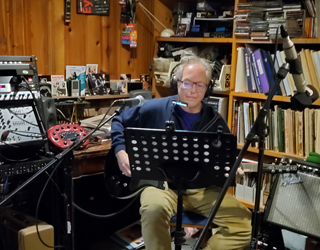
Andrew Karp recording "I See the Line."
|
I See the Line My glasses aren’t the best but they are mine
I use them when I read and drive and dine
I really should be happy but I whine
I don’t see fine, I see the line
The reading part is big and wide and clear
I see the world alright both far and near
But my world is divided here and here (gesturing)
I don’t see fine, I see the line
What really puts me right down in the dumps
Is that I don’t see the world in one big lump
From far to near I have an image jump
I don’t see fine, I see the line
But sometimes I can feel the need to change
Because my glasses don’t have no midrange
So when I use my laptop I feel strange
I don’t see fine, I see the line
My glasses aren’t the best but they are mine
I use them when I read and drive and dine
I really should be happy but I whine
I don’t see fine, I see the line
Lyrics: Jeff Hopkins | |